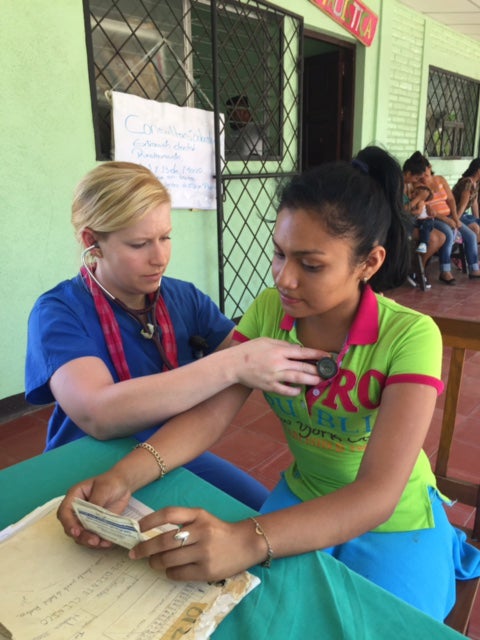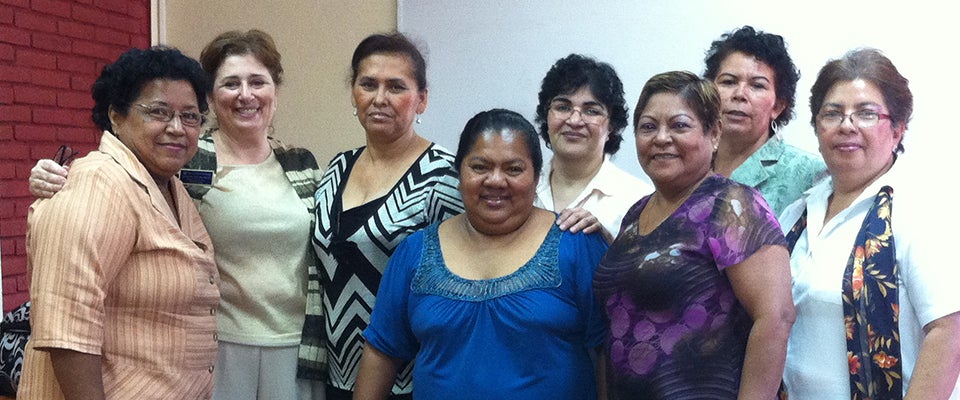'A RICH EXPERIENCE'
Trips to Nicaragua enhance learning for nursing students
Sometimes leaving your comfort zone is the best way to grow. That’s one reason why students and faculty from the College of Nursing at East Carolina University have made annual treks to Nicaragua the past seven years.
Now the college’s partnership with a nursing school there has culminated in a published study about how both schools can grow their teaching methods to better fit the needs of their students and their communities.
For seven years, in collaboration with students and faculty from ECU’s Brody School of Medicine and a non-governmental organization – Project Health for León – representatives from the College of Nursing have worked to improve clinical care in Nicaragua while furthering their own education. Because Nicaragua is one of the poorest countries in the western hemisphere, access to both educational tools and health care resources is limited there.
East Carolina’s involvement with Project Health for León originated nearly 20 years ago when Brody School of Medicine faculty members Dr. Jack Rose and Dr. Harry Adams began taking medical teams to León, Nicaragua, to offer specialized care and life-saving surgeries to people who otherwise would not have access to them.
Soon they began taking medical students and later invited the College of Nursing to collaborate. This resulted in the Nicaragua Interprofessional Study Abroad Program, a unique model of interprofessional education that is both a cultural and clinical immersion.
Comparing curricula
The College of Nursing’s work with the National Autonomous University of Nicaragua-León Nursing School over the years shed light on the differences and similarities in curricula and teaching methods between the two schools. After observing those differences firsthand, faculty from both schools decided to study them more closely to find out what they could learn from each other. Their findings – and the model they created to evaluate and compare their curricula – will be published in the April 2017 issue of the professional journal Nurse Education Today.
“We said ‘How do we teach nursing in our separate countries?’ And then ‘Is there a way that we can provide an evaluation of that?’” said Dr. Donna Lake, a clinical associate professor in the College of Nursing who authored the study along with several other faculty members from both nursing schools.

College of Nursing doctoral student Cece Kaechele examines a patient in León, Nicaragua in February.
Lake designed a system to compare the two schools’ undergraduate curricula and learned that the school in Nicaragua focused more on public health and community-based health care, while ECU’s curriculum is based more heavily on the inpatient setting.
“They taught us to consider integrating more outpatient rural health teaching in our curriculum and shared community health case studies to be utilized in our simulation labs,” Lake said of her Latin American collaborators. “We, in turn, gave them some simulation scenarios, like blood transfusions.”
Dr. Debra Kosko, a co-author of the study and clinical associate professor in the College of Nursing, agreed that the study shed light on ways both programs could improve. She said the Nicaraguans appreciated that they could focus more on inpatient and acute care.
“We both agreed that we would like to see our [curricula] evolve to have more focus on prevention,” she said.
Learning lessons
This year’s two-week trip in February enabled medical students and doctorate of nursing practice students – who are training to become family nurse practitioners – to work alongside each other and Nicaraguan health care providers in inpatient and outpatient settings. They staffed primary care clinics; provided specialty care for cardiology, HIV and obstetrical patients; and observed the surgical team, who performed eight heart surgeries during their stay.
“We were able to share knowledge from our programs and from our past experience working in the medical field together, so that was an important aspect of the trip,” said doctorate of nursing practice student Grace Anglin, who made her second trip this year.
Another student benefit of the Nicaragua experience: they’re often presented with cases they are unlikely to encounter in the United States.
“They have the opportunity to hear certain heart murmurs and examine other kinds of abnormalities that, in this country, would have been repaired at birth,” Kosko said. “It’s a very rich physical exam experience. You’re really learning to go by what you’re hearing and feeling and seeing as opposed to reading laboratory results and EKGs because they don’t have that kind of capability.”
Without many of the diagnostic tools available in the U.S., such as CT scans and MRIs, students learn the importance of getting detailed patient histories and how to rely on their physical examination skills.
A lack of resources and access to certain medications in Nicaragua also demands that nursing and medical students consider alternative treatment options to what they might recommend in the States.
“There was an infant and the mother was struggling because the baby needed this medicine and they didn’t have it in a liquid form,” Kosko said. “So she was trying to crush it and give it to the baby, and the baby was spitting up… we were trying to figure out what else we could tell the mother to do since the medication was not available as a liquid.”
Anglin said that immersing herself in the culture and dealing with patients also helped improve her Spanish, a skill that is highly advantageous for nurses practicing in the United States.
“I’ve taken four years of Spanish in my education, but being there learning from people who actually use that language makes you realize how deficient you are with that,” she said. “Other than English, the most common language we encounter for patients is Spanish, so it’s definitely important to have at least a basic understanding of Spanish.”
Click here to read the article authored by Lake, Kosko, Dr. Martha Engelke, Dr. Donna Roberson and their Nicaraguan colleagues in Nurse Education Today.

College of Nursing clinical associate professor Dr. Donna Lake, second from left, is shown with faculty from the National Autonomous University of Nicaragua-León Nursing School. Faculty from ECU’s College of Nursing collaborated with the Nicaraguan faculty on a study comparing curriculum and techniques.
